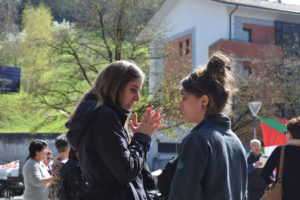My favorite RPG convention panel, “Improv DMing,” occurred at GenCon several years ago. It was mostly a Q&A session about how the panel’s host improvs games.
Someone asked what he does when the players ask to split the party. He explained that he tells the group that half of them will have to pack up and go home and schedule a separate session, because they’re asking him to run two games.
I considered that answer as basically gospel. Now, certainly, one or two members of a group can briefly scout ahead, or a party can be in two adjacent rooms during combat, but otherwise, no splitting the party.
Fast forward to a recent session of my D&D game. My players were planning a heist, and twice so far they’d mentioned wanting to play the game in separate rooms if the group split up.
The group spent most of a session figuring out how to approach the heist. Two players wanted to visit the heist location ahead of time and plant a triggered spell on an outside wall.
Assuming that this would be a short “scouting ahead” sort of situation, I took those two players into a separate room. One started the ritual (which needed about an hour in-game), while the other kept watch.
Then they proceeded to fail their rolls to keep hidden. A guard showed up. The PCs couldn’t stay hidden. The PC keeping watch tried to charm the guard, then distract the guard, and the dice were just against him.
The guard called for more guards. Worse, the player kept trying to distract them, coming up with increasingly desperate tactics, prolonging the encounter.
Thirty real-world minutes later, the players finally gave up on their ritual and retreated. We returned to the main room.
The other players were happily chatting away, holding mugs of tea in their hands. The two separated players talked excitedly (though with some disappointment) about their failed attempt to plant their spell.
We got back to the session. Nobody was bored.
During the post-game feedback session, players in both locations talked about how much they liked splitting the party. The ones in the other room felt special, while the ones “left behind” enjoyed wondering what was going on in the other room.
In fact, players in both rooms still talk about that session.
Would I split the party frequently? No. Would I split the party for hours? No. Would I split the party again? Absolutely.

![[Atom feed]](/user/themes/geek-archaeology/images/atom-feed.png)
![[RSS feed]](/user/themes/geek-archaeology/images/rss-feed.png)
![[iTunes podcast feed]](/user/themes/geek-archaeology/images/itunes-feed.png)